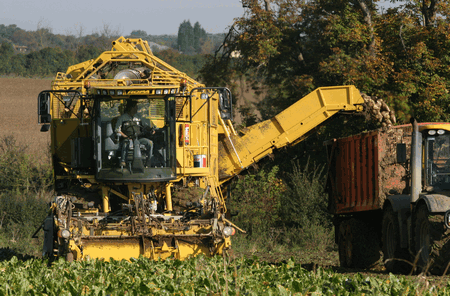Work out costs before signing 2009 beet contract, says Robert Law

Sugar beet growers last week received their 2009 contract offer, much earlier than in previous years, writes grower Robert Law. Normally it comes through in early July, and it is a foregone conclusion we will grow beet in the following season.
This year is all a bit different. The arrival of the offer has focused many growers’ minds as to whether beet has a future on their farms. The headline figure of £26.10/t for 2009 is certainly a lot better than the sub-£20/t being forecast two years ago, and may not seem a long way below the £29.75/t we were receiving before the reform process started.
But the 2009 offer price is very much a “downhill with wind following” one and relies on several indicators remaining at the same level in more than a year’s time. For example, to achieve the offer price, the wheat price will have to be over £150/t. In the past two months we have seen new and old crop wheat come down by £40/t, so the as-harvested price is now below £130/t.
At this level, the beet price would be reduced by almost £1/t under the terms of the wheat/beet pricing structure. The offer price also is based on the current exchange rate of £0.80/euro. For a long time the rate was in the 0.67-0.69 band a return to that level would see the beet price reduce by a further £1.50/t.

Then there are haulage and transport costs. On average, after transport allowances have been taken into account, there is a shortfall of about £1-1.50/t of beet delivered to the factory. This difference has been fairly consistent for years. But the spiralling cost of diesel is forcing changes some growers are being asked by hauliers for increases of 30-35% for transporting the 2008 crop and an “escalator” mechanism to protect themselves from further fuel price increases.
The average mileage per contract for the 2008 season is about 28 miles, so an increase in haulage rates could amount to another £1-plus/t. The haulage allowance is unlikely to be increased, so any increase in rates will be picked up by the grower.
What about input costs? Fuel costs are obviously increasing, but there are also step-increases in inputs elsewhere. Fertiliser price rises have managed to outstrip fuel. On our own farm we spent £140/ha fertilising the 2006 crop, £217/ha on the 2008 crop, and we forecast spending £282/ha on the 2009 crop. This means, on a 65t/ha crop, our fertiliser prices have in three seasons risen by £2.30/t. So let’s pull everything together.
If we have a scenario when we lift the 2009 beet crop of fuel and fertiliser at current levels, wheat at £130/t and an exchange rate back at £0.70/euro, the beet price would be £22.09/t. Taking off £2.30/t for additional fertiliser costs and £1/t for the increased haulage shortfall leaves £18.79/t.

There are those who grow beet crops of 65t/ha-plus on a regular basis and can produce acceptable margins at current prices. But growers with yields in the 45-55t/ha bracket will not be able to make a margin if costs spiral.
It is vital every grower knows his production costs before signing the contract. Several growers stuck with beet over the past two years to ensure they were eligible for any compensation schemes under the reform proposals. The 2009 crop has to stand up on its own feet and there can be no room for sentimentality.
British Sugar will pay a price that will get the contracted tonnage grown for its four remaining factories and no more, and growers have until 15 August to make a decision whether they wish to be a beet grower in 2009.
My advice: Do your sums taking into account the scenarios that could happen and discuss the offer and its shortcomings with your BS fieldsman. If, in the end, beet growing doesn’t work for your farm, grow something else. British Sugar can manage without your support.

